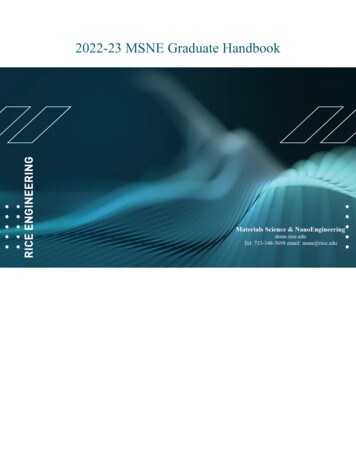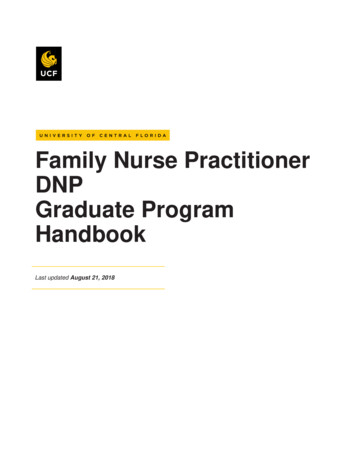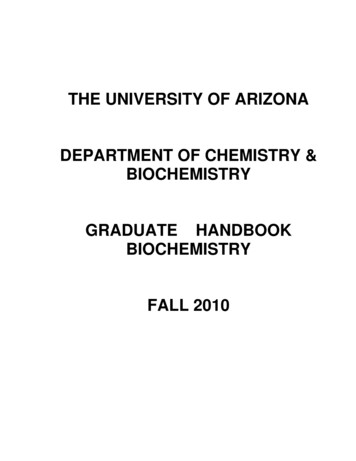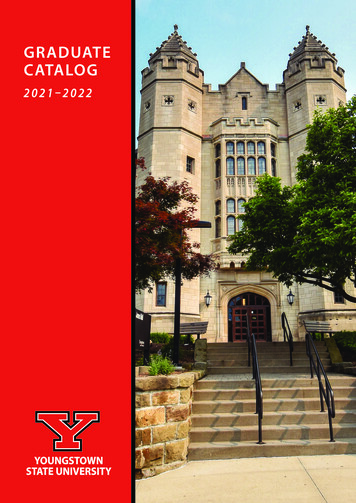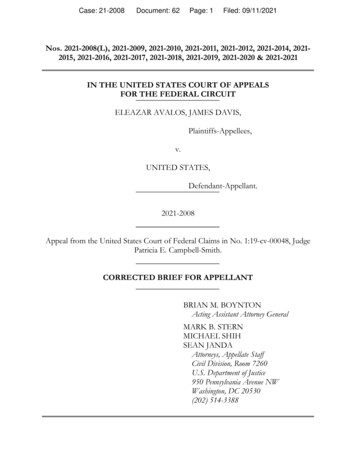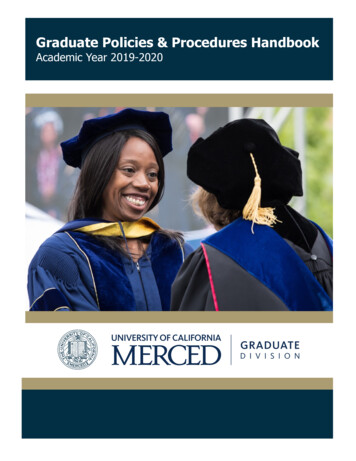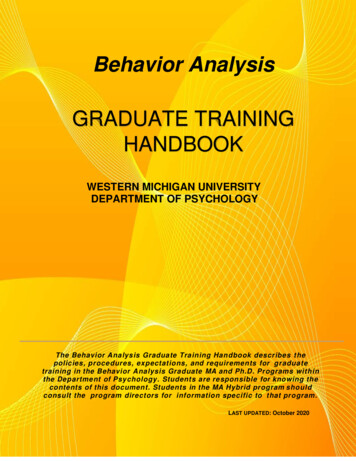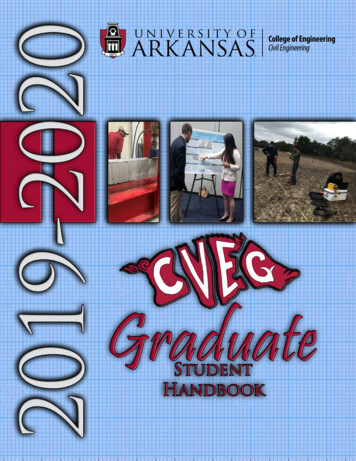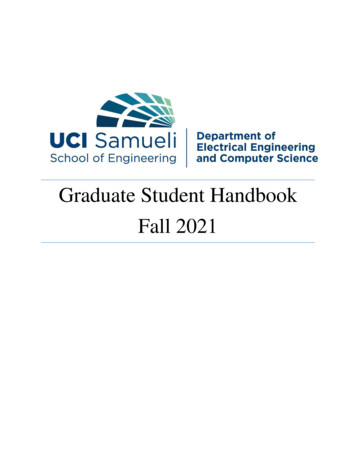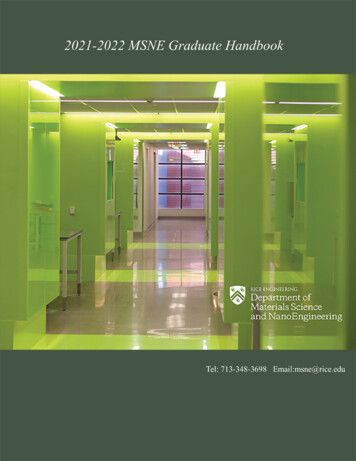
Transcription
20212022MSNEGraduateHandbookTel:7133483698 Email:msne@rice.edu
Materials Science and NanoEngineering2021-2022INTRODUCTION:This guide to graduate study in the Department of Materials Science & NanoEngineering containsinformation about degree programs; financial support; academic regulations and procedures; how to getstarted in graduate school; and other miscellaneous information of interest to graduate students. It isintended to supplement the General Announcements and the Code of Conduct by providing a more detaileddescription of the graduate program in MSNE.In case of error, omission, or conflict, policies of the General Announcements supersede those stated withinthis handbook. If the policies of the program change during a student’s tenure at Rice University, the studentcan elect to continue studies under the complete set of policies in place at the time of matriculation or maychoose to follow the updated policies in full. Students may not choose some regulations from one set ofpolicies and some from another.It is the student’s responsibility to be familiar with the rules, procedures, and requirements of the MSNEDepartment, the Office of Graduate and Postdoctoral Studies, and Rice University. It is ultimately theresponsibility of the student to know and follow all polices and timelines to allow for a timely graduation.A student failing to meet department or university requirements is subject to dismissal from the program.1
Materials Science and NanoEngineering2021-2022ADMINISTRATION:Students have access to MSNE Administrative staff for assistance. The primary contact person for graduatestudents is Kim Hardy, MSNE Graduate and Undergraduate Administrator. Please see contact informationprovided below.NameTitleEmailLocationextJohn MarshGary CisnerosKim HardyLinda LermaJessica McVeyElizabeth TippeeSenior Department AdministratorResearch SpecialistGraduate & Undergraduate AdministratorFinancial & Research AdministratorResearch AdministratorAcademic et21@E200G109 MEBE200IE200F215 MEBE200E211748953521360524743698John Marsh – Senior Department Administrator:Manages departmental funds supervises MSNE staff members.Go to John for: Funding questions. Research guidelines. Department’s physical facilities. University policies. Special circumstances.Gary Cisneros – Research Specialist:Manages MSNE lab safety, lab supply and equipment orders and equipment maintenance. All newstudents should contact Gary Cisneros to arrange a safety tour of MSNE laboratories before entry.Go to Gary for: Lab and equipment issues. Lab supply orders. Lab safety training. Lab safety issues.Kim Hardy – Graduate & Undergraduate Administrator:Assists students with academic and administrative issues during their time in MSNE and coordinatesstudent recruitment.Go to Kim for: Questions about academic policies and procedures. Assistance with processing forms related to your academic progress. Questions about stipend. Requests for verification letters (student status, etc.). Questions about course schedules and classroom locations.2
Materials Science and NanoEngineering2021-2022Linda Lerma – Financial & Research Administrator:Provides financial support for faculty members and students.Go to Linda for: Travel requests and reimbursements. Undergraduate payroll. Reimbursements via a check or cash for out of pocket expenses.Jessica McVey – Research AdministratorProvides administrative support to the MSNE department chair, Dr. Ajayan, and Ajayan research group.Manages Ajayan group funding and assists Ajayan group with research proposals.Go to Jessica for: Questions about Ajayan group funding. Ajayan group travel and personal expense reimbursements. Ajayan group payroll questions. Ajayan group credit card purchases.Elizabeth Tippee – Academic Administrator:Provides administrative support for faculty members and students, maintains the MSNE departmentalreception area and coordinates MSNE seminars and other special events.Go to Elizabeth for: Desk space assignments. Issuance of office/lab keys ( 10 deposit required for 1st two keys). Assistance with incoming/outgoing mail, the workroom, and its equipment (fax, copier, printer,and other office supplies). FedEx shipments. Problems with building access with your Rice ID card. Processing Academic Visitors paperwork, Visitor Portal. Room/Building maintenance issues. Room reservations. Questions about MSNE seminars and other departmental events. Tax exemption forms for general purchases and Texas lodging (Rice University does not pay forsales tax within the state of Texas). MSNE website maintenance.3
Materials Science and NanoEngineering2021-2022FACULTY:Faculty members have a myriad of responsibilities, including the advising and mentoring of undergraduateand graduate students and post-doctoral fellows, supervising research in their areas of interest and expertise,managing all aspects of their research labs, and instruction at the undergraduate and graduate level.2021-2022 MSNE Graduate Committee: Drs. Lou, Tang, and Pimpinelli.2021-2022 MSNE Professional Master’s Student (MMSNE) Advisors: Drs. Lou and TangDoctor of Philosophy (PhD) and Master of Science (MS) Student Advisors: The primary faculty contactfor PhD and MS students is the student’s individual advisor. The research interests and expertise of eachfaculty member can be found on the MSNE website https://msne.rice.edu/people/facultyAjayan, PulickelBenjamin M. and Mary Greenwood Anderson Professor of Engineering and Department ChairBarrera, EnriqueProfessor of Materials Science and NanoEngineeringHan, YimoAssistant Professor of Materials Science and NanoEngineeringLou, JunProfessor and Associate Chair of Materials Science and NanoEngineeringTang, MingAssociate Professor of Materials Science and NanoEngineering and Graduate ChairYakobson, Boris I.Karl F. Hasselmann Professor of Materials Science and NanoEngineeringZhu, HanyuAssistant Professor of Materials Science and NanoEngineeringPimpinelli, AlbertoExecutive Director of the Rice Quantum Institute and Materials Science andNanoEngineering Faculty FellowLoos, PeterProfessor in Practice of Materials Science and NanoEngineeringGuo, HuaAssistant Research Professor of Materials Science and NanoEngineeringPenev, EvgeniAssistant Research Professor of Materials Science and NanoEngineeringVajtai, RobertAssociate Research Professor of Materials Science and NanoEngineeringJohn, RandyLecturer of Materials Science and NanoEngineeringKabbani, AhmadLecturer of Materials Science and NanoEngineering4
Materials Science and NanoEngineering2021-2022MSNE GRADUATE STUDENT ASSOCIATION:Nguyen, ChristinePresidentSteinbach, DougVice PresidentHarikrishnan, VijayTreasureMaguire, AliannaSecretaryMiller, KristenProfessional Development ChairPottackal, NeethuSTEM Outreach ChairParra, CarlosInternational Student Outreach ChairAjay, SathvikGSA RepCampos, AstridSocial Chair5
Materials Science and NanoEngineering2021-2022STUDENT RESOURCES:ESTHER: Esther (Employee and Student Tools, Help, and Electronic Resources) is the web applicationfor students, faculty and staff. Students will use ESTHER to register for classes and retrieve certain datasuch as grades and account information.Graduate Students Association (GSA): is comprised of degree seeking graduate students at RiceUniversity. The GSA’s mission is to enrich the graduate student experience by advocating for the physicaland psychological wellbeing of graduate students, promoting graduate career and professional developmentresources, and empowering graduate student-run social programming for the Rice community.Mentor Program: The MSNE Mentor Program connects current MSNE students with incoming studentsto help the new students become established and find their way in their new environment. Valuableexperiences that the established students have gained and lessons that they have learned during their timeat Rice are passed along to students entering the program, making the transition to Rice more enjoyable andrewarding and paving the way to a successful future.StudentsShared Equipment Authority: supports and provides state-of-the-art research equipment capabilities forRice University and the extended Rice community.Student Health Insurance: All registered, degree-seeking students are required to maintain healthinsurance coverage while enrolled at Rice University. Therefore, all students are REQUIRED to eitherenroll in the Rice Student Health Insurance Plan, or request a waiver of the student Health Insurance plan.All Rice-sponsored F-1 and J-1 International Students are required to enroll Student Health Insurance Plan,please go to Office of International Students and Scholars for more information.Student Employment: Students on F-1 or J-1 visas, you have the opportunity to engage in on-campuswork or off campus practical training opportunities. However, the appropriate work authorization must beobtained before starting to work. Regardless of visa status, if you work even one day without authorization,you must leave the U.S. or face deportation.Title IX Information: Rice encourages any student who has experienced an incident of sexual,relationship, or other interpersonal violence, harassment or gender discrimination to seek support. Thereare many options available both on and off campus for all graduate students, regardless of whether theperpetrator was a fellow student, a staff or faculty member, or someone not affiliated with the university.Students should be aware when seeking support on campus that most employees are required by Title IXto disclose all incidents of non-consensual interpersonal behaviors to Title IX professionals on campus whocan act to support that student and meet their needs. The therapists at the Rice Counseling Center and thedoctors at Student Health Services are confidential, meaning that Rice will not be informed about theincident if a student discloses to one of these Rice staff members. Rice prioritizes student privacy and safety,and only shares disclosed information on a need-to-know basis. If you are in need of assistance or simplywould like to talk to someone, please call the Rice Wellbeing and Counseling Center, which includes TitleIX Support: 3311/(713) 348-3311. Policies, including Sexual Misconduct Policy and Student Code ofConduct and more information regarding Title IX can be found at https://safe.rice.edu/ .6
Materials Science and NanoEngineering2021-2022General AnnouncementsOffice of the RegistrarGraduate and Postdoctoral StudiesOffice of International Students and ScholarsOffice of Information TechnologyStudent Health ServicesWellbeing and Counseling Center7
Materials Science and NanoEngineering2021-2022ACADEMIC POLICIES & PROCEDURES:The following regulations concerning graduate student in the Department of Materials Science &NanoEngineering are in additional to the regulations and deadlines described in the GeneralAnnouncements. Students are responsible for meeting both the University and Department requirementsand deadlines.MSNE Degrees Offered:The department offers three graduate degrees:Doctor of Philosophy (PhD)Master of Science (MS-Thesis Master’s)Professional Master’s (MMSNE-Non-Thesis Master’s) The PhD degree requires completion of at least 90 semester (or credit) hours of advanced relevantstudy, of which at least 18 semester hours must be coursework and an approved thesis. As finalevidence of preparation for this degree, the candidate must pass a public oral examination andsubmit the approved thesis to the Office of Graduate and Postdoctoral Studies. The residencyrequirement for the doctorate is four semesters of full-time study at the university. Successfulcandidates must pass a qualifying exam and write and orally defend their theses on originalresearch. For more detailed information, please go to PhD degree requirement. The MS degree requires at least 30 semester (or credit) hours of study, of which at least 18 semesterhours must be coursework. The MS degree requires original work reported in a thesis and a publicoral examination. Most students take three or four semesters to complete the requirements for amaster’s degree (some programs may require more time). Students receiving a master’s degreemust be enrolled in a graduate program at Rice University for a minimum of 2 semesters of fulltime study. For more detailed information, please go to MS degree requirement. The MMSNE degree requires at least 30 semester (or credit) hours of study. Minimum residencyis one fall or spring semester of full-time or part time graduate study. There is no thesis requirementfor the MMSNE degree. For more detailed information, please go to MMSNE degree requirement.Advisor Selection:MSNE 599 “Lab Rotations and Advisor Selection” course provides an opportunity to spend time in severalresearch groups to help PhD and MS students selecting their advisors.a. Students must register for MSNE 599 in their first semester, submitting the MSNE Rotation Format the beginning of the semester to the graduate administrator to set up the rotation schedule.b. By the end of November, students must complete the MSNE Advisor Selection Form and email itto the graduate administrator.c. The graduate administrator will notify the students at the beginning of January as to who will betheir Advisors.8
Materials Science and NanoEngineering2021-2022NOTE: During the rotation, if you find an Advisor and would like to discontinue the rest of your rotation,please make sure the Advisor completes a rotation waiver form and emails it to the graduate administratorso you can end your rotation and join the advisor’s group.Changing Advisors:MSNE students are allowed to change their research Advisors, but must do so expediently since this maydelay graduation. A student who is considering changing Advisor will need approval from the DepartmentChair.Transfer of Graduate Program: go to General Announcements-Academic Policies & Procedures.If MSNE students would like to change their degree program, these are the options available:1. Change degree from PhD to MS – Students who wish to change degree programs from PhD to MSshould speak with their Advisors to see if they have enough credits and research to switch to MS. In cases where the advisor approves the amount of credits and research, students may submitthe Change Degree Form from the PhD to MS degree program.o Students are required to complete the Change Degree Form and MSNE Check ListForm detailing the credits that will be transferring to the MS program.o The admission committee will review student applications and required forms. Uponapproval by the Department Chair and by the Office of The Dean of Engineering, therequest will be sent to the Office of Graduate and Postdoctoral Studies forconsideration and final approval.o Student will defend MS thesis.o Student will submit MS thesis and apply for graduation.o Tuition will not be charged retroactively for courses already completed. In cases where a student does not have enough credits and/or research and requires additionaltime to meet the MS degree requirements, it is the decision of the Advisor as to whether toapprove the change from the PhD to MS program. This change would require that the Advisorfinancially supports the student while fulfilling additional requirements through the thesisdefense. (same process as above). If the student declines the master’s opportunity, the student will be dismissed without a degreeawarded.2. Transferring from PhD/MS to MMSNE program: Students who wish to change from PhD/MS toMMSNE program musto petition MSNE department in writing.o Students are required to complete the Change Degree Form and the MSNE MMSNECheck List Form the credits that will be transferring to the MMSNE program, andsubmit the forms to the graduate administrator.o The admission committee will review student applications and required forms. Uponapproval by the Department Chair and by the Office of The Dean of Engineering, the9
Materials Science and NanoEngineering2021-2022oorequest will be sent to the Office of Graduate and Postdoctoral Studies forconsideration and final approval.If the degree change is fully approved, students who received tuition waivers whileenrolled in the PhD/MS program will be expected to repay the tuition before they canstart the program or their professional degrees are awarded.Tuition repayment will be at the current tuition rate.Annual Performance Review: All MS/PhD students in MSNE must complete an annual review inconjunction with their Advisors in May. The purpose of this review is to: Allow the student and advisor to establish clear expectations and objectives for the coming year,including what defines satisfactory progress. Each student will be responsible for scheduling a meeting with the student’s Advisor to discuss thetopics detailed above. Following this review conversation between student and Advisor, it is thestudent’s responsibility to ensure that the annual review is submitted to the graduate administrator.If a student receives an Unsatisfactory grade, the Advisor should provide comments on what needsto be done for remediation. The student needs to submit an updated report by the end of thefollowing fall semester. If the report is deemed unsatisfactory by the Advisor again, the studentwill be put on probation and dismissed the third time.Graduate Student Transfer Credit: go to General Announcements-Academic Policies & Procedures. Ifa student wishes to have graduate courses taken at another university or within a different program at Ricecounted as credits toward a MSNE advanced degree, the student should petition the department in writing,listing not only the grades earned but also including detailed description of the courses and syllabi involved.Transfer of credits are subject to the following restrictions: Courses must be from a regionally accredited U.S. institution or an international institutionofficially recognized by that country’s Ministry of Education or equivalent. The course must be recorded on an official transcript sent directly from the original institution toRice or hand-delivered by the student in an official sealed envelope. Students seeking to transfer credits must submit an approved Graduate Request for Transfer CreditForm to the Office of the Registrar. For PhD degree, the number of transferred credit hours will be decided by a member of the MSNEGraduate Committee in consultation with the Department Chair on a case-by-case basis. PhDcandidates must still complete a total of 90 semester hours of advanced study and four semestersof full-time residency at Rice University. For the MS degree, only 6 transferred credit hours will be accepted towards the degree requirement.The candidates need to obtain approval from their Rice instructors for the courses they wish towaive. The syllabi and course descriptions of the substitute courses from the candidate’s priorinstitutions must be provided to the instructors to determine the appropriateness of the waiver. Thefinal decision will be made by a member of the MSNE Graduate Committee. For the MMSNE degree, only 6 transferred credit hours will be accepted towards the degreerequirement. The candidates need to obtain approval from their Rice instructors of the courses theywish to waive. The syllabi and course descriptions of the substitute courses from the candidate’sprior institutions must be provided to the instructors to determine the appropriateness of the waiver.The final decision will be made by a member of the MSNE Graduate Committee.10
Materials Science and NanoEngineering2021-2022Replacement Course(s): If a student wishes to substitute other courses for required MSNE courses, thestudent must complete the Replacement Course Approval Form, and obtain signatures from the student’sAdvisor(s) and a MSNE Graduate Committee faculty member, then email the form to the graduateadministrator to be placed in the student’s academic file. Without a fully signed Replacement CourseApproval Form, the course will not count towards the student’s degree.Grades:For PhD and MS degrees, students must maintain a minimum overall Grade Point Average (GPA) of 3.0and a minimum semester GPA of 3.0. If a student’s semester GPA is below 3.0, the student will be placedon academic probation. If the student’s semester GPA is below 3.0 for two consecutive semesters, thestudent’s performance will be reviewed by the Graduate Committee in consultation with the DepartmentChair, and the student may be dismissed from the program.For MMSNE degree, students must maintain a minimum overall Grade Point Average of 2.67 and aminimum semester GPA of 3.0 or higher in all Rice coursework applied to satisfy the non-thesis master’sdegree requirements with a minimum grade of B-(2.67 grade points) in each course. If a student’s semesterGPA is below 3.0, the student will be placed on academic probation. If the student’s semester GPA is below3.0 for two consecutive semesters, the student’s performance will be reviewed by the Graduate Committeein consultation with the Department Chair, and the student may be dismissed from the program.The record of a graduate student who receives a failing grade in a course will be reviewed, and thedepartment will make specific recommendations regarding further study at the university. Standard letter grade: A graduate student is expected to earn letter grades of at least B- in allcourses taken. If a student receives a grade below B- in a core course, the student has to retake thecourse. If a student receives a grade below B- for an elective course, it may be substituted withanother course with the advisor’s written approval, which should be sent to the graduateadministrator for inclusion in the student’s academic file. Satisfactory/Unsatisfactory Courses: Satisfactory/unsatisfactory courses are those that assign agrade of S or U rather than a letter grade. With S/U courses, instructors issue the S grade if thestudents have successfully completed the course or a U if they have not. An S grade will not counttowards the student’s GPA but will count towards total credits earned. A U grade will not counttowards the total credit requirements for MSNE graduate degrees. Students who receive a Ugrade in MSNE 800-Research & Thesis, please go to General Announcements-AcademicPolicies & Procedures for details and latest information on academic probation and dismissal.For full details Rice University policies, please go to General Announcements.11
Materials Science and NanoEngineering2021-2022Stipend for PhD/MS: You must register at least 9 credit hours to receive stipend. The departmentalfunding is available to most incoming PhD and MS students during their first year of studies. Thedepartment will provide these students with a 9-month stipend at the current MSNE graduate student stipendrate. The stipend is paid semi-monthly, in fall from August 16th to December 31st, and in spring fromJanuary 1st to May 15th.Advisors become responsible for financially supporting students on the first day of their tenth month ofstudy. Advisors are expected to pay 100% of the student’s stipend unless that stipend is funded by anexternal fellowship, scholarship, training grant, or other source of external funding which covers all or aportion of the student’s stipend. Continued financial support depends on acceptable academic progress.Summer Support (from May 16th to August 15th) – Students should discuss their summer plans well inadvance with their advisors. In order to be paid by Rice for the summer, students must register for at least9 hours of MSNE 800. Students planning a summer internship off-campus, with their advisor’s approval,must inform the graduate administrator by May 1 in order to complete the required financial arrangements.The department does not provide financial support to Professional Masters (MMSNE) students.Termination of Financial Support – General Announcements’ section on Academic and JudicialDiscipline.External Fellowships/Scholarships: Students are encouraged to seek external fellowships and awards.The Office of Proposal Development offers an extensive array of proposal development services whendeveloping and writing proposals for federal agencies and other entities to seek funding for the researchprojects. Assistance can also be obtained from the Rice Graduate and Postdoctoral Studies. Students areencouraged to take advantage of the services and resources available to them. Students are required to notifyMSNE graduate administrator of any external fellowships or scholarships they receive immediately uponreceiving an award including awards received prior to matriculation.The National Science Foundation and many other government agencies and foundations offerscholarships, fellowships and other funding opportunities for graduate students. Some of these opportunitiesare listed on the website of the George R. Brown School of Engineering. Graduate students are stronglyencouraged to seek out these opportunities. They should inform the MSNE graduate administrator whenthey decide to apply for non-university funding.Teaching Assistant: All teaching assistants (TAs) must attend a TA workshop. After being assigned aMSNE course, they will need to meet with the instructor to discuss their TA responsibilities before thecourse begins. They will be expected to attend classes for the course they TA upon the request of theinstructors.Student Vacation: Students are eligible to receive 2 weeks of vacation annually with stipend. Thevacation policies should be discussed directly with the student’s Advisor. If you plan to take vacation longerthan 2 weeks, please check with your Advisor whether the stipend support continues through the extendedvacation time. If not, please complete the vacation form with your Advisor’s signature and email the formto the graduate administrator before the vacation starts. Vacations, leave time, or other absences must be12
Materials Science and NanoEngineering2021-2022approved by the student’s Advisor in advance and must be in compliance with University rules andguidelines from funding agencies.Withdrawals: go to General Announcements-Academic Policies & ProceduresMedical leaves and other types of interruptions of study should be handled according to the guidelines inthe General Announcements.13
Materials Science and NanoEngineering2021-2022MSNE AREAS OF SPECIALIZATION:1.2.3.4.5.6.7.8.9.10.11.Advanced Manufacturing.Atomic Scale Characterization.Computational Materials Science.Low-dimensional and nano-materials.Electronic and Opto-Electronic Materials.Energy Conversion and Storage.Metals and 3D Printing.Multifunctional Composites.Nanomechanics.Polymer Science.Quantum Materials and Phenomena.14
Materials Science and NanoEngineering2021-2022FIRST-YEAR STUDENT CHECKLIST: Student ID Acquired from the RUPD police station and used for swipe access to manycampus buildings. Bring a document that has your student ID number on it as well as a photo ID. Setup direct deposit for stipend Esther (https://esther.rice.edu) Employee PayInformation Lab safety training EHS general safety training any additional specialized trainings neededfor your specific research (EHS safety refresher course required every year). Normally offeredduring first-year graduate student orientation. https://safety.rice.edu Lab access varies based on lab space, some have physical keys, others a keypad code andsome require an ID card swipe (if you need ID access for a building or room, contact ElizabethTippe and include your student ID number (“S” followed by an 8-digit number) Fund numbers These are the accounts to charge for research supplies, etc. This varies basedon advisor and research project. You can obtain this information from your advisor. Linda Lermaalso handles the accounting and manages these funds. Stockroom account The chemistry department houses a stockroom on campus for commonlab supplies. Located on the first floor of Space Science. To set up a new account go to https://chemistry.rice.edu/new-stockroom-account. Youwill need to obtain a fund number before creating a stockroom account. Feel free to emailCHST@rice.edu with any questions. Susan and Carlos are very helpful. Airgas account This account is for ordering compressed gases. Follow the link below forinstructions on how to create an account and how to make a gas order. https://chemistry.rice.edu/compressed-gas-orders Shared equipment access Managed by the Rice Shared Equipment Authority (SEA). First, you will need to complete the forms for internal users athttps://research.rice.edu/sea/forms (Internal User Information and Internal UserAgreement forms). This will require your advisor’s signature and a fund number. For theInternal User Agreement form, you can save yourself from having to submit this formmultiple times by listing “all SEA equipment” under the “Equipment to be used” line.This is simply your advisor giving you permission to get trained on the instruments youlist on the form. Submit to meri.c.dix@rice.edu. Next, after confirmation from Meri, you can create an account on FOM(https://fom.rice.edu/). This system is used to request trainings, reserve equipment,monitor equipment status and logon to your session. Rice Marketplace This platform is used for making purchase orders for labequipment, materials, etc 15
Materials Science and NanoEngineering2021-2022 Training must be taken from Rebecca Riley (rr37@rice.edu) individually or in a group.Schedule a training session by emailing her. This must be done prior to getting anaccount set up.Once training is complete, you can register your account here: https://buy.rice.edu/. Inorder to make purchases you need to be on Rice VPN.16
Materials Science and NanoEngineering2021-2022REQUIREMENTS FOR THE PhD DEGREE:If you are accepted as an MSNE PhD student b
Student Health Insurance: All registered, degree-seeking students are required to maintain health insurance coverage while enrolled at Rice University. Therefore, all students are REQUIRED to either enroll in the Rice Student Health Insurance Plan, or request a waiver of the student Health Insurance plan. All Rice-sponsored F-1 and J-1 .
